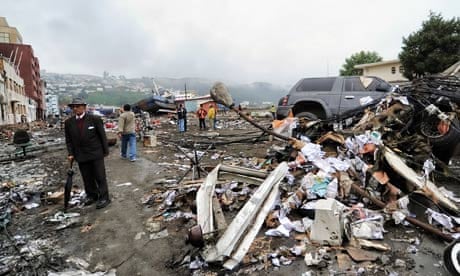Armed troops yesterday patrolled the streets of Chile for the first time in more than two decades as widespread looting in the south led President Michelle Bachelet to order 10,000 soldiers to protect supermarkets, pharmacies, banks and department stores.
Chilean National Television reported "neighbour versus neighbour" fighting in the coastal areas of Coronel and Lota as food shortages and lack of electricity caused by Saturday's devastating earthquake created scenes of desperation.
By late yesterday afternoon the news was filled with images of bands of men armed with rifles, metal stakes and hatchets stalking the streets of the coastal city of Concepción, attacking firefighters, burning a supermarket and adding an air of menace to the already tragic situation.
While life in the capital, Santiago, slowly returned to normal for most residents, Jacqueline van Rysselberghe, the mayor of Concepción, made a desperate plea for more troops and aid from the national government.
"We were distributing water in trucks and the trucks were assaulted. Now no one wants to distribute the water," she said. "Fear is everywhere, armed men with pistols are attacking residential homes … send the largest number of troops possible."
A heavy cloud of sSmoke filled Concepción as looters burned a supermarket, and several firefighters were injured by falling debris.
In San Pedro de la Paz, a city next to Concepción, looters stripped a clinic clean of medicine and supplies.
"There was lots of shooting last night, then the military showed up," said a resident, Rosa Medina, in an interview with TVN. Convoys of armed troops were sent to the region to provide logistical support, supplies and street patrols.
The government has raised the official earthquake toll to 723 killed and 19 missing, but reports from local communities suggest that hundreds more are missing, many feared washed out to sea.
As rescue crews and journalists arrived at remote coastal areas, they found the heaviest damage was done by the tsunami that followed Saturday's earthquake, flattening already fractured buildings. A Google application to find missing people registered more than 39,000 names.
Relatives of two British couples caught up in the devastating earthquake in Chile spoke of their relief last night as it emerged that they were alive and well.
Andre Lanyon and Laura Hapgood, from Guernsey, and Kirsty Duff and Dave Sandercock, from Scotland, were able to get in touch with relatives in the UK by phone yesterday after they reached Santiago.
Lanyon's mother, Valerie, 55, said: "I haven't slept for three days and I certainly won't be getting any tonight. We're so excited and relieved. He sounded fine. They had just arrived in Santiago when they called."
Chilean officials yesterday called on the international community to donate temporary bridges, satellite phone equipment, water purification systems, dialysis machines and generators. After initially saying foreign aid would not be needed, Bachelet yesterday asked the UN for aid.
Last night it was reported that a small plane bringing aid to Concepción had crashed, killing all six people on board.
Field hospitals sent by the Brazilian and Argentine governments were expected to arrive today. Mariano Fernandez, the Chilean foreign minister, met foreign ambassadors to co-ordinate the aid. The US secretary of state, Hillary Clinton, is due to arrive in Santiago today to meet Bachelet and discuss joint aid efforts.
Tens of thousands of Chileans built bonfires outside their homes and camped in the streets, afraid to live under damaged roofs and wary of looters.
Many people housed their neighbours and volunteers brought tents and fresh water to families on the street, but patience wore thin as many survivors entered their third day without electricity, communications and fresh water.
Saturday morning's 8.8 earthquake, one of the biggest ever recorded, hit southern Chile at the peak of the summer tourist season. The coastal community of Constitución, home to 50,000 people, was packed with tourists for Noche Veneciana, a summer festival, when first the earthquake then waves estimated at 10 metres hit the town. Offshore, houses bobbed in the surf, testament to the near-complete destruction of the town.
In Concepción, rescue workers continued to dig through rubble in an effort to reach survivors inside a 14-storey building that toppled over during the earthquake.
"I crawled through a hole, up a few metres. There was screaming. It was so dark, all I could see was a distant light," said Alex Tapia, an Ecuadorean, who crawled from the remains of his sixth-floor apartment with his wife and child when the building collapsed. "We crawled out through that tunnel. People were trapped and yelling for help."
An estimated 100 people are still inside the building.
Speaking outside the tangle of cement and steel, Commander Juan Carlos Subercaseux of the fire service said: "We have confirmation [that survivors exist], as someone broke glass. We can't say how many are in there."
In a grim effort to identify victims, firefighters placed a guitar, a saxophone and two laptops on the sidewalk and asked family members if they recognised them. More than half the apartments in the one-year-old building were empty, which lessened the death toll.
With autumn rains weeks away, officials scrambled to organise housing for the estimated 1 to 2 million Chileans who are homeless.
